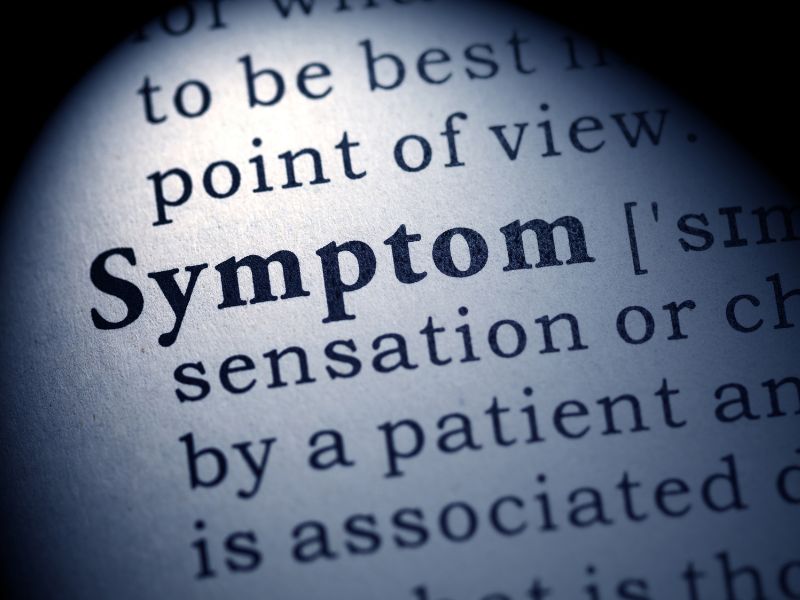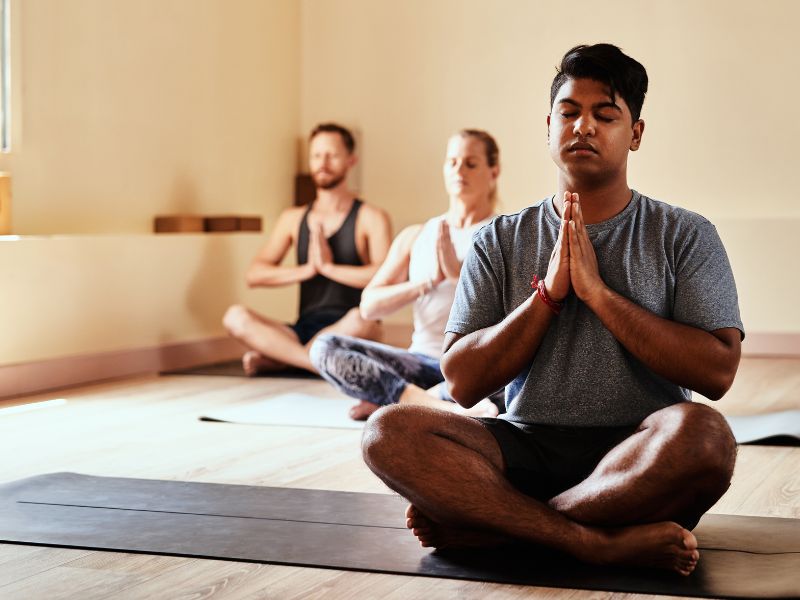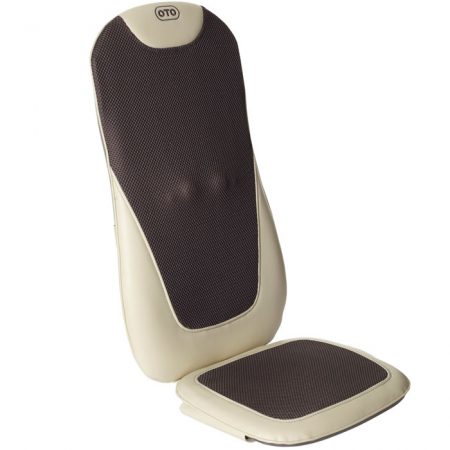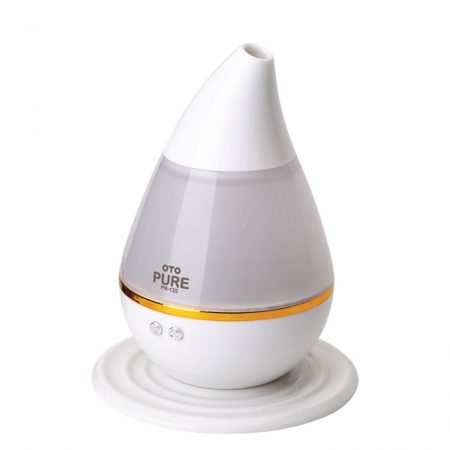Anxiety is a normal and often healthy emotion. However, when it becomes persistent and intense, it can interfere with daily activities and relationships.
This is where meditation can help. Meditation has been shown to be an effective tool in reducing anxiety and promoting relaxation. In this article, we will explore the benefits of meditation for anxiety, how to get started with it, and tips for making it a part of your routine.
By the end of this article, you will have a better understanding of how meditation can help you take control of your anxiety and live a more peaceful life.
Definition of Anxiety
Anxiety is an emotional state characterized by feelings of worry, nervousness, or fear. It is a normal response to stressful situations and can be beneficial in motivating individuals to take action.
However, when anxiety becomes persistent and excessive, it can interfere with daily activities and relationships and become a disorder. Anxiety disorders are the most common mental health disorders in the United States and affect millions of people every year.
Symptoms of anxiety disorders can include constant worry, avoidance of certain situations, physical symptoms such as heart palpitations, and difficulty sleeping.
If you are experiencing persistent anxiety, it is important to seek help from a mental health professional.
Overview of Mediation as a Treatment Option
Meditation is a practice that involves focusing the mind on a particular object, thought, or activity to achieve a mentally clear and emotionally calm state. It has been used for thousands of years as a tool for mental and physical wellness and is gaining popularity as a treatment option for anxiety.
Meditation has been shown to reduce symptoms of anxiety by lowering stress levels, promoting relaxation, and improving mood. It is a low-risk, low-cost, and easily accessible option that can be done in the comfort of your own home.
Research has shown that regular meditation practice can be as effective as medication for some individuals with anxiety disorders.
However, it is important to note that meditation should not be used as a substitute for professional medical treatment, but rather as a complementary approach.
Symptoms of Anxiety

The symptoms of anxiety can vary from person to person and can range from mild to severe. Some common symptoms of anxiety include:
- Excessive worry or fear
- Restlessness or feeling on edge
- Fatigue
- Irritability
- Muscle tension or headaches
- Sleep difficulties
- Difficulty concentrating
- Avoidance of certain situations or activities
- Rapid heart rate or heart palpitations
- Nausea or upset stomach.
It is important to note that these symptoms can also be indicative of other conditions and it is best to consult with a mental health professional for a proper diagnosis and treatment plan.
Causes of Anxiety
Anxiety can be caused by a variety of factors, including:
- Genetics: Anxiety can run in families and be influenced by genetic factors.
- Brain chemistry: Imbalances in brain chemistry can contribute to anxiety disorders.
- Life events: Traumatic life events, such as death of a loved one, divorce, or job loss, can trigger anxiety.
- Substance abuse: Substance abuse, such as alcohol and drugs, can worsen anxiety symptoms.
- Chronic medical conditions: Chronic medical conditions, such as heart disease or diabetes, can increase the risk of anxiety.
- Chronic stress: Chronic stress can lead to the development of anxiety disorders.
- Withdrawal from certain medications: Withdrawal from certain medications, such as benzodiazepines, can cause anxiety.
It is important to note that anxiety can also be a combination of these factors. A mental health professional can help determine the underlying cause of anxiety and develop an effective treatment plan.
Different Types of Anxiety Disorders
There are several different types of anxiety disorders, including:
- Generalized Anxiety Disorder (GAD): characterized by persistent and excessive worry about a variety of life events and activities.
- Panic Disorder: characterized by unexpected and repeated episodes of intense fear, accompanied by physical symptoms such as heart palpitations and sweating.
- Social Anxiety Disorder: characterized by intense fear of being judged or scrutinized by others in social situations.
- Obsessive-Compulsive Disorder (OCD): characterized by unwanted and intrusive thoughts (obsessions) that lead to repetitive behaviors (compulsions).
- Specific Phobias: characterized by intense fear of specific objects or situations, such as flying or heights.
- Post-Traumatic Stress Disorder (PTSD): characterized by intrusive thoughts, flashbacks, and avoidance behaviors related to a traumatic event.
It is important to note that these are only a few examples of anxiety disorders and that there are other subtypes as well.
It is best to consult with a mental health professional for a proper diagnosis and treatment plan.
How Meditation Works
Meditation works by training the mind to focus and calm itself. During meditation, an individual focuses their attention on a specific object, thought, or activity to calm their mind and reduce stress.
This can be achieved through mindfulness meditation, where the individual focuses on their present moment experiences, or through visualization meditation, where the individual imagines a peaceful scene in their mind.
Meditation has been shown to have a number of physiological effects, including:
- Reducing activity in the amygdala, the part of the brain responsible for processing fear and stress.
- Increasing activity in the prefrontal cortex, the part of the brain responsible for reasoning and decision-making.
- Lowering cortisol levels, the hormone associated with stress.
- Increasing the production of GABA, a neurotransmitter that promotes feelings of relaxation and calm.
By regularly practicing meditation, individuals can train their mind to better handle stress and reduce anxiety symptoms. It is important to note that the effects of meditation are cumulative, and the more one practices, the greater the benefits can be.
Benefits of Meditation for Anxiety
There are several benefits of using meditation for anxiety, including:
- Reducing symptoms of anxiety: Regular meditation can help reduce symptoms such as worry, stress, and panic.
- Improving mood: Meditation has been shown to improve overall mood, including reducing symptoms of depression.
- Decreasing stress: Meditation has been shown to reduce cortisol levels, the hormone associated with stress.
- Improving sleep: Meditation can help individuals fall asleep faster and sleep more deeply, which can improve overall physical and mental health.
- Boosting self-awareness: Meditation can increase self-awareness, helping individuals better understand their thoughts and emotions.
- Enhancing focus and concentration: Regular meditation can help improve focus and concentration, which can be beneficial in managing anxiety symptoms.
- Building resilience: Meditation can help individuals build resilience, making them better able to handle stress and anxiety in the future.
It is important to note that meditation should not be used as a sole treatment for anxiety and should be used in conjunction with other therapies, such as cognitive behavioral therapy and medication, under the guidance of a mental health professional.
Research Studies on the Effectiveness of Meditation for Anxiety
There have been several research studies on the effectiveness of meditation for anxiety, with many showing positive results.
- A study published in JAMA Psychiatry found that mindfulness-based stress reduction (MBSR) was associated with a significant reduction in symptoms of anxiety and depression.
- A systematic review published in the Journal of Clinical Psychology found that mindfulness meditation was effective in reducing anxiety symptoms in individuals with anxiety disorders.
- A study published in the Journal of Anxiety Disorders found that a mindfulness-based intervention was effective in reducing symptoms of anxiety and improving quality of life in individuals with generalized anxiety disorder (GAD).
- A study published in the Journal of Alternative and Complementary Medicine found that a mindfulness-based stress reduction (MBSR) program was effective in reducing symptoms of anxiety and depression in medical students.
- A study published in the Journal of Clinical Psychology found that mindfulness meditation was effective in reducing symptoms of panic disorder and agoraphobia.
These studies demonstrate the potential of meditation as a complementary treatment for anxiety, but it is important to note that more research is needed to fully understand its effectiveness and determine the best methods for its use.
It is also important to work with a mental health professional to determine the best course of treatment for individual needs.
How to Practice Meditation for Anxiety
To practice meditation for anxiety, follow these steps:
- Find a quiet place: Find a quiet place where you can sit or lie down comfortably. Avoid distractions such as music or television.
- Get into a comfortable position: Sit or lie down in a comfortable position with your back straight.
- Focus on your breath: Close your eyes and focus on your breath. Breathe deeply and slowly, paying attention to the sensation of the air entering and leaving your body.
- Let go of distractions: When your mind begins to wander, simply acknowledge the distraction and redirect your focus back to your breath.
- Set a timer: Start with a short meditation session, 5-10 minutes, and gradually increase the length of time as you become more comfortable.
- Practice regularly: Make meditation a daily habit, even if it’s just for a few minutes a day.
- Use guided meditations: Consider using guided meditations, which are available online or through meditation apps, to help you get started and stay focused.
It is important to remember that meditation is a process, and it may take time to see the full benefits. Be patient with yourself and continue to practice regularly for best results.
Additionally, it is important to work with a mental health professional to determine the best course of treatment for your individual needs.
Techniques for Reducing Anxiety Through Meditation

There are several techniques that can be used to reduce anxiety through meditation, including:
- Mindfulness meditation: This technique involves focusing on the present moment and being aware of your thoughts, emotions, and physical sensations without judgment.
- Body scan meditation: This technique involves lying down or sitting comfortably and focusing on each part of your body, releasing any tension or stress.
- Loving-kindness meditation: This technique involves sending feelings of love and compassion to yourself and others.
- Breath focus meditation: This technique involves focusing on your breath and counting each inhale and exhale.
- Progressive muscle relaxation: This technique involves tensing and relaxing different muscle groups to release physical tension and stress.
- Visualization meditation: This technique involves creating a calming and peaceful mental image, such as a beach or forest, to reduce anxiety and stress.
- Mantra meditation: This technique involves repeating a word or phrase, such as “peace” or “calm,” to quiet the mind and reduce anxiety.
It is important to try different techniques and find what works best for you. It may also be helpful to work with a meditation teacher or mental health professional to determine the best approach for your individual needs.
Incorporating Meditation Into Daily Life
To incorporate meditation into daily life, follow these tips:
- Make it a habit: Choose a specific time and place each day to practice meditation, and stick to it as much as possible.
- Be consistent: Start with short sessions, 5-10 minutes, and gradually increase the length of time as you become more comfortable.
- Incorporate it into your routine: Consider incorporating meditation into your morning or bedtime routine, or as a break during the day.
- Use reminders: Set reminders on your phone or schedule time in your calendar to practice meditation regularly.
- Use technology: Consider using meditation apps or online resources to help you get started and stay motivated.
- Make it enjoyable: Find a comfortable and quiet place to practice, and consider using candles, incense, or relaxing music to create a calming atmosphere.
- Practice with a partner: Consider practicing meditation with a friend or family member to increase accountability and motivation.
By incorporating meditation into daily life, it can become a helpful tool for managing stress and reducing symptoms of anxiety.
Remember to be patient and persistent, and to work with a mental health professional to determine the best approach for your individual needs.
Finding the Right Meditation Technique for You

Finding the right meditation technique for you may involve some trial and error. Consider the following tips to help you find the right approach:
- Research: Do research and read about different techniques, their benefits, and how they are practiced.
- Try different techniques: Don’t be afraid to try different techniques and find what works best for you.
- Listen to your body: Pay attention to how you feel during and after meditation. If a particular technique causes stress or discomfort, try a different approach.
- Work with a professional: Consider working with a meditation teacher or mental health professional to determine the best technique for your individual needs.
- Incorporate into daily life: Incorporate the technique into your daily routine and stick with it to see the full benefits.
- Be patient: Remember that meditation is a process and it may take time to see the full benefits. Be patient with yourself and continue to practice regularly.
By following these tips, you can find the right meditation technique for you and begin to experience the many benefits of meditation for managing stress and reducing symptoms of anxiety.
Combining Meditation With Other Treatments for Anxiety
Meditation can be an effective tool for managing symptoms of anxiety when used in combination with other treatments. Consider combining meditation with:
- Therapy: A mental health professional can help you develop strategies for managing anxiety and can also provide support and guidance during meditation.
- Lifestyle changes: Incorporating healthy habits such as regular exercise, a balanced diet, and adequate sleep can help reduce symptoms of anxiety.
- Medication: In some cases, medication prescribed by a doctor may be necessary to manage symptoms of anxiety.
- Support groups: Connecting with others who have similar experiences can provide a sense of community and support.
It is important to work with a mental health professional to determine the best approach for your individual needs.
By combining meditation with other treatments, you can achieve greater symptom relief and improve overall well-being.
In conclusion, meditation can be a highly effective tool for managing symptoms of anxiety. By practicing regularly and incorporating meditation into daily life, individuals can experience the many benefits of meditation for reducing stress and managing symptoms of anxiety.
When combined with therapy, lifestyle changes, medication, and support from others, meditation can provide a comprehensive approach for managing anxiety. It is important to work with a mental health professional to determine the best approach for your individual needs.
Remember to be patient, persistent, and to give meditation a chance. With practice, meditation can become a helpful tool for managing stress and reducing symptoms of anxiety.










Leave a comment